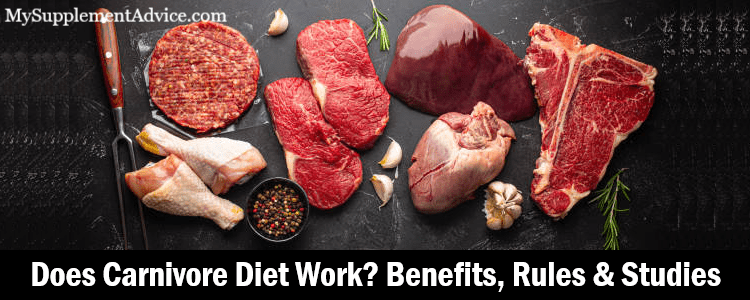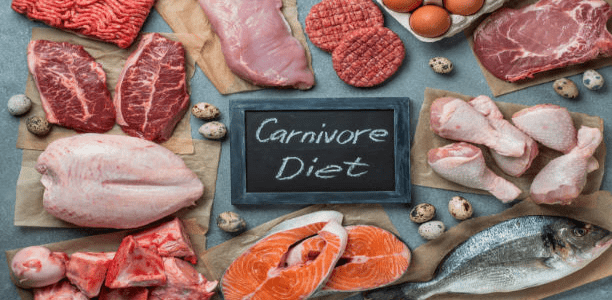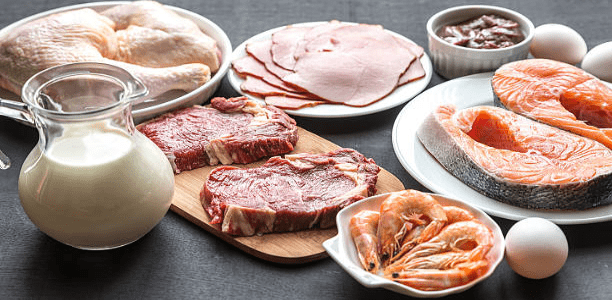
So does Carnivore Diet work for weight loss?
Can you actually lose weight while following this diet (safely)?
Well – we're going to analyze this diet in detail:
- guidelines and rules to follow it
- what studies and research say
- its top benefits
- its possible downsides
If you want to find out how you can lose weight following the Carnivore diet (if any), you're in the right place.
Note: This article includes references and studies related to Carnivore Diet.
Carnivore Diet (In A Nutshell)
From the name itself, Carnivore Diet is very easy to understand.
Basically, it's a restrictive dietary approach in which you can only consume animal products.
Now – here are the health issues it claims to improve:
- problems with digestive health
- obesity/excess weight or diabetes
- well-being and mental health
- some types of inflammation
- chronic diseases (heart, liver, kidney and more)
Now, there are different types of food groups that need to be eliminated from the said diet:
- the actual Carnivore Diet actually has several subtypes
- the foods you can eat depend from one subtype to another
But all in all, you pretty much have to avoid all plant-based products.
So you have to focus on eating only meats (or other foods sourced from animals).
According to some users' results, this diet may be very helpful when it comes to weight loss.
However – there's minimal research about its effectiveness:
- This type of diet is anything but balanced.
- It's not necessarily recommended to follow it for a longer period of time.
- If you do so, you may end up with further health problems.
But if you're eager to try the Carnivore Diet, it's best to consult a doctor first.
Again – it's a significant change in your diet, so it's better to be medically supervised.
Sure enough – you can also try it on your own.
But pay attention to know when to stop, in case you body asks you to.
What Is Carnivore Diet?
To begin with, let's talk about the Carnivore Diet first.
As you can tell by it's name, it's also referred to as an “all-meat diet” [1].
Now – here are the important details you should know about it:
- its main goal is to improve overall health and well-being
- the main food groups that should be consumed come from animals [2]
- it also claims to offer intervention for different health problems
To be exact, here are the target issues of the Carnivore Diet [3]:
- obesity and diabetes
- liver and kidney disease
- cardiovascular disease
- other chronic diseases
- inflammation
- digestive health
- memory and mental health
At this moment, it's quite obvious that this diet relies on animal products entirely.
So don't expect it to include absolutely any plant-based foods in the process.
Lastly, as I said, it's highly recommended to consult a healthcare professional before trying it.
How Carnivore Diet Works
Now – let's see how exactly this Carnivore Diet works.
Firstly, you need to be aware of the type of dietary approach it promotes.
It's a high-fat, moderate protein and very low carbohydrate diet [4].
Actually, it has a very similar pattern to the ketogenic diet.
Based on some research, there are several guidelines that come with the diet.
In other words, you should respect some rules when following it.
So here are the most important points on how it works in general:
- The first thing to do is to eliminate all types of foods that are rich in carbohydrates.
- You should focus more on consuming animal products (meat, eggs, dairy products or fish) [5].
- To compensate for the lack of carbohydrates, you need to increase your fat intake from meat cuts, cheese and butter.
- You also need to consume enough protein to maintain muscle mass and support body functions.
- However, only a moderate amount of protein is recommended (so that it won't hinder ketosis).
- Drinking water is very important to help with digestion and satiety [6].
- The diet emphasizes whole foods instead of processed and repackaged foods.
In addition – the Carnivore Diet is often related to ketosis.
Now, ketosis is a metabolic state in which the body burns fat [7].
This produces ketones that are used for energy supply (instead of glucose) [8].
Once you limit the intake of carbohydrates, you will start consuming energy from your fats.
Ideally, this process would lead to a reduced appetite and weight loss.
However – it's not always that perfect.
That's because ketosis comes with some potential risks as well.
Overall, the Carnivore Diet is considered a restrictive diet.
That's mostly because it promotes the removal of nutrient-rich foods in order to work effectively.
No nutritionists recommends giving up fruits and vegetables, right?
That's exactly why this diet comes with a lot of risks.
Carnivore Diet & Research
Unfortunately, there's very limited research about the efficacy of the Carnivore Diet.
Again, it's a restrictive diet that requires you to consume only animal-based products.
Also – it claims to offer different benefits for the body.
With that, here are some studies that mentioned how the diet improved some health issues:
- maintaining triglycerides and cholesterol levels constant [9]
- controlling blood sugar in people with type 2 diabetes [10]
- improving weight management [11]
- regulating appetite and feeling of satiety [12]
- increasing energy levels [13]
As you can see, the studies are mostly related to losing weight.
Based on some research, overweight people have a higher risk of developing type 2 diabetes [14].
But again – the studies behind Carnivore Diet are very basic.
So if you're thinking it's helpful for other health issues, there's not enough evidence to prove that right now.
That's why scientifically speaking, this diet doesn't have any real benefits.
Carnivore Diet's Benefits
You should have a clear view of the Carnivore Diet's (potential) benefits by now.
If followed correctly, here's how it can help (according to its claims) [15]:
- prevents obesity and its complications
- decreases the risk of diabetes and normalizes blood pressure
- reduces digestive symptoms (bloating, constipation and gas)
- supports a better mental health and well-being
- improves inflammation
According to these benefits, it's safe to say that its main target is weight loss.
That's because you need to avoid carbs in this diet.
This leads to losing weight, which makes a lot of sense.
The rest of this diet's effects are considered rather minor benefits.
For this reason – don't expect any life-changing and extraordinary improvements in your health.
After all, there's still very little evidence to prove the Carnivore Diet's claims/benefits.
Carnivore Diet's Downsides
Consuming fats, protein and minimal carbohydrates comes with a lot of problems.
So let's take a look at the downsides of the Carnivore Diet:
- nutrient deficiencies due to the elimination of plant-based foods [16]
- increased risk of heart disease, since the diet is not balanced [17]
- higher risk of type 2 diabetes and other chronic diseases [18]
- imbalances in the gut bacteria [19]
- higher risk of obesity because of increased calories [20]
- lacks a significant amount of studies to prove its safety and efficacy [21]
In addition, this diet is extremely difficult to follow in the long run.
That's simply because of its extreme restrictions.
Now, you might find it hard to adjust to the diet if you're a fan of plant-based recipes.
Honestly – that's not really considered a balanced diet [22].
Just look at the nutritional facts of the foods this diet promotes.
With that being said, it has a high risk of causing all sorts of negative reactions.
But overall, it's clearly not a diet for everyone.
I personally would never be able to follow it correctly (not would I want to).
What You Can Eat In Carnivore Diet
Well, the list of food allowed in the Carnivore Diet is quite obvious.
The first thing you should remember is they should consist of animal products only.
To be exact, here's the variety of foods allowed when following this diet [23]:
- beef and lamb dishes (roasts, ground and steaks)
- organs (heart, kidney, tongue, brain and liver)
- poultry (turkey, duck and chicken)
- pork (chops, bacon and sausage)
- dairy products (butter, heavy cream and cheese)
- whole eggs (which means including both yolks and whites)
- seafood and fish (tuna, shrimp, crab, sardines, scallops and salmon)
- bone broth made of animal connective tissue and animal bones
The food list above emphasizes the consumption of animal products.
But you can only add a small amount of plant-based products:
- only herbs and spices
- their are meant to flavor your foods
However – there are some pointers when it comes to consuming the foods above:
- some people might not be allowed to eat a specific seafood or fish (due to allergy)
- the diet plan is individualized along with the serving/portion size
- the duration of the diet varies from one person to another (but still not for the long term)
So if you're planning to try the Carnivore Diet, it's best to consult a healthcare provider first.
That's because its restrictions are challenging and trying it on your own is very risky.
Foods To Eliminate In Carnivore Diet
On the other hand, let's now discuss the food groups that are generally eliminated in the Carnivore Diet.
Overall – you're not allowed to eat pretty much everything that is different from meat.
So here are the examples of the restricted foods [24]:
- nuts and seeds
- fruits and vegetables
- all types of grains and legumes (rice, oats, corn, cereals, beans, lentils and chickpeas)
- sugar and sweeteners (table sugar, honey and maple syrup)
- packaged and processed foods (fast foods, crackers, chips and other snacks)
As you can see, almost all of the points listed above are plant-based.
So you should really need to eliminate almost all foods that come from plants.
Now – there's a reason why they are not allowed in the meal plan.
All of them are considered high in carbs, which is a big no when following this diet.
Some vegetables, like cruciferous ones (cauliflower and broccoli), are sometimes allowed.
But it depends on the health conditions of a certain individual.
Final Conclusion
Carnivore Diet requires the consumption of animal products only.

- diabetes, obesity and related complications
- digestive health issues
- mental health
- heart, liver, kidney and other chronic diseases
- several types of inflammation
However – these benefits are on paper only.
There are very few studies regarding its positive results.
In theory, this diet is extremely easy to follow, because its rules are very simple.
You only have to avoid all sorts of plant-based products.
But the reality is completely different and makes it incredibly hard to follow correctly.
Now, some people experienced a significant weight loss while trying it.
But just like any other diet, it's not free from side reactions.
One major consequence is nutrient deficiencies that can lead to chronic conditions.
You're basically eliminating foods that are rich in essential nutrients – so what did you expect?
Overall – I'm not a fan of the Carnivore diet.
It's pretty dangerous to try and you may feel like your body craves fruits or vegetables.
Since its benefits aren't documented so far, it's not a diet I would actually try.
References:
1 – https://www.diabetes.co.uk/diet/-carnivore-diet/
2 – https://www.mcgill.ca/-oss/article/health-nutrition/-carnivore-diet/
3 – https://www.frontiersin.org/articles/10.3389/-fnut.2021.702802/
4 – https://www.hsph.harvard.edu/-nutritionsource/diet-reviews/-ketogenic-diet/
5 – https://ipan.deakin.edu.au/-2022/10/-what-is-the-carnivore-diet/
6 – https://www.ncbi.nlm.nih.gov/-pmc/articles/-PMC6209729/
7 – https://www.ncbi.nlm.nih.gov/-books/-NBK499830/
8 – https://www.ncbi.nlm.nih.gov/-books/-NBK493179/
9 – https://www.ncbi.nlm.nih.gov/-pmc/articles/-PMC2174488/
10 – https://pubmed.ncbi.nlm.nih.gov/-34934897/
11 – https://www.ncbi.nlm.nih.gov/-pmc/articles/-PMC3253466/
12 – https://www.ncbi.nlm.nih.gov/books/-NBK537084/
13 – https://www.sciencedirect.com/-topics/-low-carbohydrate-diet/
14 – https://www.diabetes.co.uk/-diabetes-and-obesity/
15 – https://carnivore.diet/-carnivore-diet/
16 – https://pubmed.ncbi.nlm.nih.gov/-32833688/
17 – https://www.ncbi.nlm.nih.gov/-pmc/articles/-PMC8030119/
18 – https://www.cambridge.org/-core/british-journal-of-nutrition/-meat-consumption/
19 – https://www.ncbi.nlm.nih.gov/-pmc/articles/-PMC5385025/
20 – https://www.ncbi.nlm.nih.gov/books/-NBK235018/
21 – https://www.ncbi.nlm.nih.gov/-pmc/articles/-PMC9154285/
22 – https://europepmc.org/article/med/-32833688/
23 – https://www.thecarnivoredietcoach.com/-carnivore-foods/
24 – https://www.diabetes.co.uk/diet/-carnivore/












